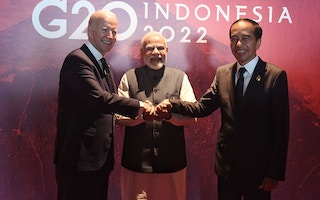Biden’s approval ratings are low and the latest opinion polls put him neck and neck with Trump, who quit the global Paris climate agreement and loosened many environmental regulations during his 2017-2021 presidency.
The frontrunner for the Republican nomination, Trump denies climate science and has been vocal against Biden’s renewable energy investments, saying that if elected he would renege on a US$3 billion US pledge to the Green Climate Fund which supports climate action in developing nations.
Will climate change feature in Modi’s re-election bid in India?
Climate change is seldom a major political issue in India, the world’s third-largest emitter of greenhouse gases, with religious and communal issues and the economy set to dominate debate as Prime Minister Narendra Modi prepares to seek a third term in the upcoming national election.
Modi cemented his frontrunner status after his Bharatiya Janata Party (BJP) won three major state elections in December.
During his 10 years in power, he has established India as a climate leader in the Global South, meeting ambitious renewable energy expansion targets ahead of schedule and improving energy efficiency.
But his government has been criticised for diluting environmental protection laws to benefit business and perpetuating coal mining.
Along with its opponents, the BJP has not yet published its election manifesto, but past campaigns have made only passing reference to the issue as part of pledges related to the development of agriculture, or water and power infrastructure.
However, with an ongoing El Nino weather pattern set to continue into the first half of 2024, extreme weather such as crop-threatening erratic monsoon rains and heatwaves could make headlines as campaigning starts.
India is highly vulnerable to climate change, with 86 per cent of the days in 2023 recording extreme weather events nationwide.
How could Indonesia’s election affect rainforest protection and its switch from coal?
Indonesia, which holds a general election on Feb. 14, is one of the world’s top 10 greenhouse-gas emitters and home to rainforests and peatlands crucial to containing global carbon dioxide (CO2) emissions.
Deforestation rates have slowed under current President Joko Widodo, finishing his second and final term, but Indonesia still ranked fourth globally for primary tropical forest losses in 2022, according to the nonprofit World Resources Institute.
Some environmental specialists fear rainforest protection could be undermined by soaring election campaign costs as politicians develop close ties with natural resource companies to fund their campaigns.
Meanwhile, all three leading presidential candidates - including frontrunner and current defence minister, Prabowo Subianto - have told Reuters they will consider ending the state power utility’s monopoly in a bid to speed the transition to clean energy from coal in the country of 270 million people.
Will Europe’s climate backlash gain steam?
The 27-member European Union, which is responsible for about 7 per cent of global greenhouse gas emissions as the world’s fourth biggest emitter, holds parliamentary elections in June.
In 2023, the European Parliament approved major reforms to boost the ambition of EU climate policies, such as reforming the carbon market to raise the cost of emitting climate pollutants for power plants and factories.
However, a political backlash has been growing among centre-right lawmakers who want to soften climate policies, among them a law to restore degraded natural ecosystems, which squeezed through parliament after being fiercely contested.
Poll gains by a resurgent far-right could fuel the pushback against green policies.
Similar debates over the speed and ambition of green policies could feature in Britain’s general election, which Prime Minister Rishi Sunak has indicated will take place in the second half of the year.
Sunak - whose party is trailing in the latest polls - has committed to hundreds of new oil and gas licenses in the North Sea, saying more than 100 licenses would be granted and announcing legislation in November to require the government to hold annual licensing rounds.
He has made climate issues a key point of differentiation with the opposition Labour party, announcing a watering down of green plans in September, such as delaying a ban on sales of new petrol cars, while adding he remains committed to net zero emissions by 2050.
Labour leader Keir Starmer has pledged to decarbonise Britain’s electricity system by 2030, including by investing heavily in green industries, and said at COP28 he would make Britain “stand tall in the world” on climate issues.
This story was published with permission from Thomson Reuters Foundation, the charitable arm of Thomson Reuters, that covers humanitarian news, climate change, resilience, women’s rights, trafficking and property rights. Visit https://www.context.news/.

















